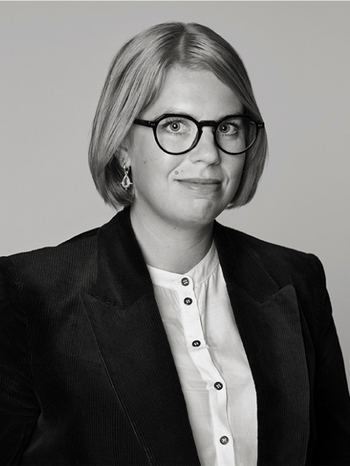Max Walter Svanberg
"Mörk hybrid föder ljuslängtande hjärta"
Signed by Max Walters and dated -60-61. Mixed media on paper, 68.5 x 99 cm.
Provenance
Göte Ahlberg, Trelleborg.
Private Collection.
Exhibitions
São Paulo Art Biennial, 1965, cat. no 31.
Malmö Museum, "Hyllning till Max Walter Svanberg", 28 September - 29 October, 1972, cat. no. 95.
More information
In 1945, Max Walter Svanberg's first breakthrough came at a solo exhibition at Gummesons konsthall in Stockholm. In the catalog written by Artur Lundkvist, Max Walter Svanberg is welcomed as an “inventive visual poet”.
Towards the end of the 1940s, Max Walter Svanberg participated in a number of major and international exhibitions. In 1953, together with others from the Swedish Imaginist group, he exhibited at the Galerie de Babylon in Paris and was discovered by one of the founders of Surrealism, André Breton. Breton came to praise Svanberg and said of Svanberg: “Among the great encounters of my life, I count that with Max Walter Svanberg's work, which has allowed me to grasp the meaning of fascination from within, by allowing me to suffer it in all its strength”.
Max Walter Svanberg's second big breakthrough came in his hometown of Malmö in 1956 at Galerie Colibri. The exhibition catalog contained texts written by both André Breton and Louis-Paul Favre. The exhibition received good reviews, and the Malmö poet Ilmar Laaban hailed the paintings as “heraldic eroticism in grotesque patterns, polished with precious stones”.
Max Walter Svanberg's surrealist world leaves no one untouched. It can almost be classified as an art form in which the images are characterized by a tension centered on women and beauty, consistently by a great admiration of the woman, often in redesigns with fish, birds, butterflies and plants.
Particularly internationally, Max Walter Svanberg is considered to have had the same impact on surrealism in Sweden as Paul Delvaux in Belgium, Toyen in the Czech Republic, Wilhelm Freddie in Denmark and Mac Zimmermann in Germany.
The auction's “Dark hybrid gives birth to a light-loving heart” is an unusually large motif for the artist.
In the exhibition catalog for Malmö Museum's 1972 exhibition, Lasse Strömberg writes in the introduction about Svanberg's art:
“Woman is the central motif in Max Walter Svanberg's art, the focal point around which his imagination tirelessly revolves. He himself has repeatedly emphasized the relationship in enthusiastic program statements. Ten years ago, in connection with the major exhibition in Lund, he wrote, for example: “My art is the worshipper's hymn to woman, to this strange hybrid of vision and reality, of convulsive beauty and chaste temptation”. Even this brief quotation shows - as does a glance at the works of art - that it is not a question of woman in general, but of a huldra, a female entity that does not exist in the world of the mind except as a promise. The woman is “strange”, she is a “hybrid”, vision and reality intersect in her and she fills the artist with an ecstasy that reaches its full expression only in art.
























































